Exporting a Report
The Export Report function provides access to your detailed data for further analysis through a report in Excel format.
In this article you will find:
- How to export a new report
- How to download the existing report
- Reports troubleshooting
- How to read the exported report
How to export a new report
- Go to Reports
- Select the preferred report in your Saved Reports list or click + BUILD REPORT to build a new one
Use Search to find the required report in the list
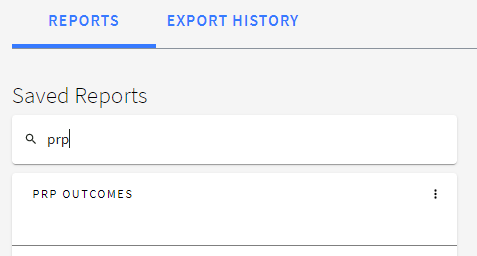
3. Click EDIT at the top right of the screen
3. Once the report has opened, click Export in the top right corner to initiate data export.
Feel free to move to any other tab if required. When the report is ready, you’ll see a notification banner at the top of the page.

Clicking VIEW on the banner will take you directly to the EXPORT HISTORY tab where you can find your report at the top of the reports list and download it.
You can click CLOSE on the banner to close it and access your report later.
How to download the existing report
All the Report Builder and Circle raw data exports are stored in the EXPORT HISTORY of the Reports tab.
There’s a table where you can find the details of your report:
- Report name
- Circle name: click the Circle name to go to the Circle Details page
- The person initiated the export, the time and the date the export initiated
- The time and the date the export completed
-
The time is displayed according to the user's local time set on the device
-
- The status (Failed, Pending or Ready to download)
- Action: the button DOWNLOAD activates when the report is ready to download
Click the arrow near the required column to put the items in the ascending / descending order.
![]()
Initially, the sorting is applied only to the visible results (about 25 items). To see the whole list, scroll down the page in order to load the rest (missing) items and then sort them.
To download the existing report:
To get the latest data in the report, re-export it.
- Go to Reports and click EXPORT HISTORY tab
- Find the report you’d like to download
- Use Search to find your report faster
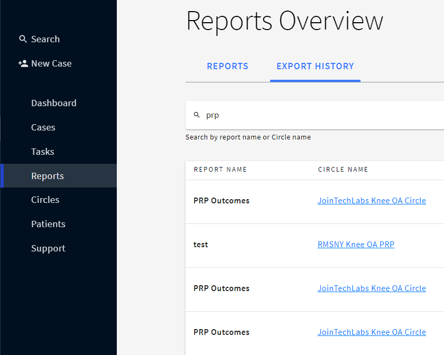
3. Click DOWNLOAD next to the required report to download it on your device in the .xsls format

Reports Troubleshooting
- If the latest cases are not included in the report, re-export the report.
- If you don’t see PI data and/or the data of other Circle members in the report, your access to these data could have been limited. Contact your Circle administrator for more details.
- If you were granted access to the data, re-export the report to see the missing info.
- If the access to PI data was disabled, you won’t see the PI data when downloading the existing report.
How to read the exported report
The data ownership level can be adjusted for Circle administrator and Circle members to make PI data visible/non-visible in the exported Excel report.
In the Excel report, you’ll find the information on each case selected in the Cohort (1 tab = 1 cohort), and a tab with the Legend to understand the report.
Cohort tab includes:
- Case-related (general) info:
- Case ID
- Patient ID*
- Subscriber ID - the ID of the Subscriber to whom the given case belongs
- Visible only for Circle administrator
- Patient Last Name*
- Patient Middle Name*
- Patient First Name*
- Birthdate*
- Email*
- Mobile Number*
- Country*
- PI Region
- Language of Communication
- Case Creation Data
- Case Commencement Date
- Treatment Date
*the visibility depends on the data ownership settings
Survey-related info (each survey has a code put at the beginning of the column header):

- SG: Scoring group score - the result of the scoring group selected as Y axis for the graph
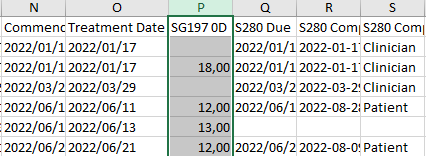
- Survey due date
- Survey completed date
- By whom the survey was completed
- Survey language
- The answers to the survey questions (for “decoding” the keys refer to the Legend tab)
- the questions in the file go in the same order as in the protocol
Example: S217QT1Q569, whereS217 - Survey title (“Demographic and Diagnostic Survey”)
QT1 - Single selection question
Q569 - question “Smoking status?”
Legend contains:
- Date when the report was exported
- Circle name
- Protocol name
- Total number of cases - information of the archived and empty cases (with no answers in the surveys) is not included in the statistics
- Total Data Points - archived and empty cases are not included in the statistics
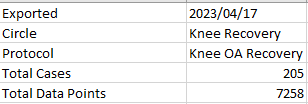
The Legend information is presented as follows:
Survey keys and their names
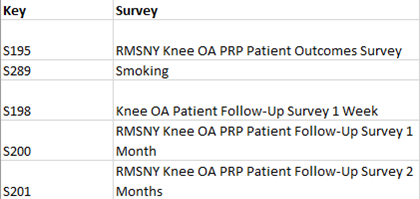
Keys to Scoring groups and their names

Keys to the questions, where:
The questions in the legend go in the same order as in the protocol.

1. Key column presents the key of the question:
S - number of a Survey
| S217 | Diabetic Foot Syndrome Pre-Treatment Demographic and Diagnostic Survey |
QT - Question type number (the number is static):
QT1- Single Selection
QT2 - Multiple Selection
QT3- Group Question
QT5 - Text
QT6 - Number
QT7 - Date
QT9 - Analog
QT10 - Image
QT11- PDF
Q (Q- 962) - question number
2. Survey name
3. Question type
4. Question name
5. Additional Information: indicates the units of measurements or the answer options to the question
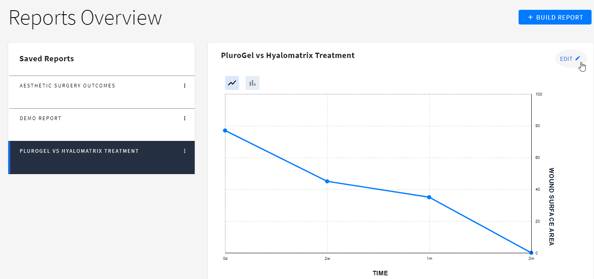
 at the top right of the screen
at the top right of the screen 

